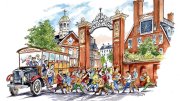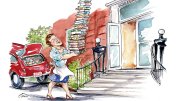1900
Newell Boathouse opens for business, the foundation is laid for the Harvard Union, and construction begins on the Stillman Infirmary.
1920
The increased student population at Harvard reflects a national trend; the Bulletin’s editors attribute the upswing to the fact that “the boys and young men who took part in the war learned from their experiences…that a college education was worth while” and that more families can afford the tuition.
1935
Director of athletics William J. Bingham states in the Crimson that if the German government persists in excluding Jewish athletes from the 1936 Olympic Games in Berlin, Harvard will not be represented on the American team.
1945
The “tight little masculine microcosm…exploded like the atom,” reports the Bulletin, when the Faculty of Medicine, “after much deliberation and many misgivings on the part of some,” admits 12 women to the class of 1949. The women, the editors caution, are “henceforth to be accounted ordinary students…no longer objects either of curiosity or of alarm.”
1960
In his inaugural lecture as Abbot Lawrence Lowell professor of the humanities, Howard Mumford Jones outlines a weighty responsibility for American scholars: “The fate of the world may depend upon the ability of Americans to understand and express the origins, directions, and implications of American life.”
1970
A bomb explodes in the Center for International Affairs, causing damage but no injuries—the first such incident at Harvard since disgruntled students set off an explosion at a chapel in 1834.
1995
“A frizzy-haired man of great amiability, for whom many at Harvard feel warm affection,” Irish poet Seamus Heaney, then Boylston professor of rhetoric and oratory, wins the Nobel Prize in Literature. The Swedish Academy of Letters honored him “for works of lyrical beauty and ethical depth, which exalt everyday miracles and the living past.”
2020
Just 40 percent of undergraduates are permitted on campus for the fall, and they must take their classes online to guard against COVID-19. This includes all first-years who wish to be in residence. The plan is for them to return home for the spring term, enabling seniors to finish their studies in Cambridge.









